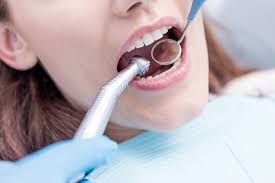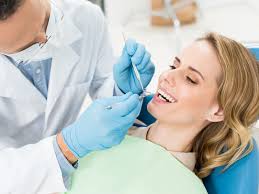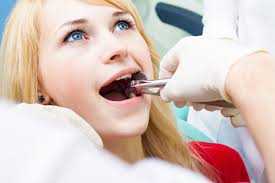What Can Happen in You Avoid the Dentist
Today’s dentists use the latest technology and can perform even the most complex procedures without causing you much discomfort. This is especially true if you go to the dentist on a regular basis. On the other hand, if you postpone your visit to the dentist for too long, there can be quite a few negative consequences. Here are the seven worst outcomes that are likely to occur if you postpone your visits too long.
- You Can Lose Your Teeth
Losing your teeth is one of the most serious consequences of avoiding the dentist. Almost all problems affecting the teeth and gums are treatable -if they are addressed in a timely manner. However, if you ignore warning signs and don’t get regular checkups, you can lose your teeth. This can occur due to advanced periodontal disease or from tooth decay that goes untreated for too long. This will result in having embarrassing gaps in your mouth. Then the only option is to get costly dentures, which will mean having to go to the dentist anyway!
- Painful Toothaches
Cavities and other dental problems become painful if they remain untreated. Sometimes people ignore problems like pain when chewing or sensitivity to hot or cold foods because the pain isn’t severe. If you don’t address the cause, however, the pain is likely to get worse over time. You can self-medicate using aspirin or stronger pain killers, but this does not address the real issue. Do you really want to walk around with a chronic toothache? It’s much better to go to the dentist at the first sign of discomfort and get the problem taken care of.
- Gum Disease
Periodontal or gum disease is a widespread problem that can have many harmful effects on your health. This is not something that occurs overnight, but usually results from long term neglect of the teeth and gums. If you have painful gums or gums that bleed easily, these are symptoms of periodontal disease. If neglected, this can lead to painful inflammations and even losing your teeth. There is also research that shows that people with gum disease are more likely to suffer from heart disease and other health problems.
- Painful and Costly Dental Procedures in the Future
People who avoid the dentist can only do so for so long. When you start getting severe toothaches, you will then be motivated to finally make an appointment, and by that time, you might need emergency dental care. The longer you wait, though, the more likely it is that you’ll have to undergo painful and expensive treatments. For example, filling a cavity is usually a fast, simple and relatively inexpensive procedure. But if you wait until you need a root canal, you will have to make multiple visits and undergo a long and painful process. If you go to the dentist at least once per year, he or she will usually be able to catch any problems in the early stages. This makes your visits fairly simple and pain free. Avoiding the dentist, however, ends up bringing about the things you fear the most -pain and large bills.
- Increased Risk of Developing Many Diseases
There is increasing evidence linking gum disease and tooth decay with other health problems, such as heart disease. Plaque that occurs in the gums can eventually spread to other areas of the body. That’s another reason why it’s important to keep the mouth clean and free of plaque and bacteria. There are also links between gum and dental problems and other serious diseases, including diabetes, dementia, respiratory problems and certain types of cancer. While health experts are still researching these issues to determine the exact cause of these links, it seems prudent to look at the evidence and take good care of your teeth and gums if you want to preserve your overall health.
- Your Teeth Get Stained
One of the most basic procedures performed by dentists is cleaning your teeth. This not only makes them look better, but it protects your teeth and gums from disease. Many things can cause your teeth to get stained. This includes smoking, eating certain foods and even drinking coffee. Regular cleanings remove stains and debris. While you hopefully brush and floss regularly, a professional cleaning is much more thorough. Most dentists recommend getting a cleaning at least once per year. However, if you have a problem such as periodontal disease, you may need to get them cleaned several times per year.
- You May Develop Bad Breath
Even if you aren’t concerned about your long term health, you probably don’t want people to avoid you because you have bad breath. While there can be many causes of bad breath or halitosis, dental problems are one of the main reasons for this. Tooth decay and gum disease will contribute to giving your breath an unpleasant odor. Of course, part of having fresh breath is maintaining good oral hygiene on a daily basis. It also helps to avoid tobacco and foods that have strong odors, such as garlic and onions. However, no matter what you eat or how much mouthwash you use, if you avoid the dentist you are likely to develop bad breath due to untreated problems in your mouth.

Reason Some People Never Get A Cavity.
Hint – it’s not better brushing and flossing.
I’m pretty sure you and I have both lived the exact same moment.
Remember the weird smell as the drill burred into your tooth, or the awkward position of your jaw as countless fingers and tools were jammed into your mouth? How about the moment when the dentist said rinse and spit, and all your fat lip and numb tongue could manage was to dribble wetness down the front of your chin?
As it turns out we’re not alone. Our dread, fear, frustration and disappointment at the pain and expense of another cavity is something 92% of adults experience.
So what makes the other 8% of adults different? Why have they never experienced the misery associated with a cavity?
The truth is they have a secret – one that I share with you below.
You Shouldn’t Blame Yourself for Cavities
We’ve all heard the key to avoiding cavities is to eat less sugar, do a better job brushing and flossing, and see the dentist every six months. Some of us have even tried to buy the best toothpaste and toothbrush we could find.
But before blaming yourself – your sweet tooth, your hurried brushing or your never flossing – remember that if your current toothpaste really worked, you wouldn’t have cavities.
The notion that better diet and hygiene can reduce your risk of getting cavities is only partially true, as I’ll explain below. And even if avoiding sugar and mastering the perfect toothbrush stroke worked, let’s be honest – these aren’t solutions that fit into our lives and habits.

If You Haven’t Been to the Dentist in Years, Here’s What to Expect
When scheduling your appointment, make sure that you are honest when reporting your last dental visit, as it will give your dentist and hygienist an idea of what to expect, what tools are needed, and how long the appointment will be.
If it’s been a few years since your last cleaning, here is what you might expect at your appointment:
- Bleeding gums. When your hygienist goes to floss your teeth, you will likely experience some bleeding. This occurs because your gums are not used to the pressure of the floss excavating between your teeth and gums. You can prevent some of this bleeding by flossing thoroughly, every day prior to your appointment.
- Since you have not had your teeth professionally cleaned in some time, you can expect a significant amount of plaque build up on the surface of your teeth. It is for this reason that your cleaning may take longer than usual.
- X-rays. Your dentist will want to take X-rays of your teeth and mouth to make sure that no serious problems have developed in the time since your last appointment. From the X-rays, your dentist will be able to assess your oral health in its entirety and then provide any necessary treatment recommendations from there.
- Comprehensive mouth-check. After your teeth have been cleaned by the hygienist, your dentist will meticulously check your mouth for cavities, signs of gum disease, and possible problems that could have occurred. If you haven’t been to the dentist in over 10 years, it is likely that you will need to fill a cavity and/or take preventative action against gum disease.
- One-on-one conversation. After your examination, you will want to chat with your dentist about next steps. You may have to make a follow up dental appointment for a filling, or perhaps you will be referred out for a more intensive procedure. Before leaving the office, make sure to schedule an appointment for six months out to continue on your journey to optimal dental health.

If You Don’t Want To Visit The Dentist, Eat These 4 Foods More Often
There are times you find problems with your teeth and you wonder the primary cause of the condition especially when you never forget to brush your teeth. Later, the condition gets worse, and you are forced to consult a dentist for diagnosis or advice.
This consequence has never been your expectation at all, but by eating some recommended food and choosing wisely the ones to avoid, you will solve many teeth problems and keep them healthy always. Below are four foods that you should consider eating and the others you should avoid to ensure you don’t visit your dentist any time soon.
- Eat lots of detergent foods
You might probably be wondering what detergent foods are. These are crispy or crunchy foods that provide significant benefits to our teeth such as preventing tooth decay. The concept of how they work is they have a crunchy texture, thereby cleaning the teeth by removing food particles stuck in them. Some examples include apples, celery, carrots, unsweetened popcorn, cucumbers, pears, etc.
A great tip you should note is to ensure you eat detergent foods after meals. The main reason is that you may not have time always to carry a toothbrush to brush your teeth in some circumstances. Therefore, ensure you form a habit of eating detergent foods after meals or even take them as snacks instead.
- Dairy products
You probably know that most dairy products provide nutrients for stronger healthy teeth. Well, they are also excellent foods that reduce and neutralize the acidic nature in our mouth hence providing better health in our teeth.
- Dark chocolate
Dark chocolate such as the one found in cocoa beans contains beneficial ingredients such as tannins, flavonoids, and polyphenols. These ingredients have high antioxidants levels that provide excellent benefits to your teeth. For instance, tannins which are responsible for their sweet dark pigments, help to prevent cavities by preventing bacteria particles from sticking to your teeth.
Alternatively, flavonoids slow down tooth decay process, while polyphenols limit bacteria’s effects by neutralizing the microorganisms that result to bad breath, prevent gums’ infections and combat tooth decay.
- Sugarless chewing gum
Practice chewing sugarless gum since it increases the flow of saliva. This habit will decrease plaque acid and food particles that cause tooth decay while also strengthening the teeth. If you chew the gum after eating, the increased flow of saliva helps to neutralize the acids formed when food is broken down by the plague bacteria on your teeth. Also, this acid is harmful because it destroys tooth enamel slowly, hence causing tooth decay later.
Worst foods you should avoid:
- Starchy and sticky foods
When you chew starchy foods such as soft bread and potato chips, your saliva breaks the starch into sugar. The paste-like substance formed sticks to the crevices between your teeth which can cause cavities. Sticky foods also damage your teeth because they are likely to stay on your teeth longer hence you should avoid them.
- Carbonated soft drinks
These drinks contain a lot of added sugar and citric or phosphoric acids that erode tooth enamel. Carbonated soft drinks are acidic and therefore, not suitable for your teeth at all. Others such as caffeinated drinks lead to a dry mouth hence the mouth lacks saliva known to neutralize the acids that cause tooth decay. The best solution when you use soft drinks is to try and drink them along with a cup of water.
- Sticky Candy and sweets
When you were growing up, your parents probably cautioned you against overeating sugary treats such as candy and sweets in a party or a special event to avoid visiting a dentist. It turns out they were right because eating tons of sugar is unhealthy for your tooth.
The sweet and sugary components found in candies sticks in tooth crevices also increasing chances of bacteria survival and growth. Such sugary treats also provide acidic environments which are a common cause of cavities and tooth decay.